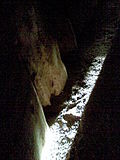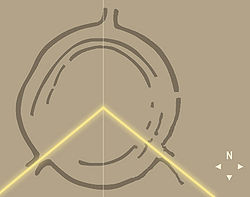Winter solstice
The winter solstice is the time when the sun has the biggest distance to the Tropic of Cancer. After this, the sun is going to move to back in the direction of the equator.
The Earth revolves around the Sun. The sunlight reaches the Earth at an angle. On each day of the year, the sun will be perpendicular at a given latitude. At the start of spring and at the start of autumn it passes over the equator. On the June Solstice it is over the Tropic of Cancer, at 23.5 degrees north. In the Northern Hemisphere this is the longest day of the year, which has the shortest night and is called the Summer Solstice. In the Southern Hemisphere this is the shortest day of the year, which has the longest night and is called the Winter Solstice. On the December Solstice it is over the Tropic of Capricorn, at 23.5 degrees south. In the Southern Hemisphere this is the longest day of the year, which has the shortest night and is called the Summer Solstice. In the Northern Hemisphere this is the shortest day of the year, which has the longest night and is called the Winter Solstice.
For the northern hemisphere, the Winter solstice is around 21 December. This means that the sun is at the southern tropic. For the southern Hemisphere, the winter solstice is around 21 June. This means that the sun is at the northern tropic.[1]
The word solstice comes from Latin Sol (sun) and sistere (to not move), winter solstice meaning Sun standstill in winter.
The earth prone and moves in an elliptic way around the sun. Because of this, the point from where the sun is shining moves between the Tropic of Capricorn and the Tropic of Cancer.
The winter solstice is celebrated around 21 December since 1582, when Pope Gregory XIII introduced the Gregorian calendar.[2]
Winter Solstice Media
Neolithic site of Goseck circle in Germany. The yellow lines indicate the directions in which sunrise and sunset are seen on the day of the winter solstice.
Sunlight directed through the 17 arches of Seventeen Arch Bridge, Summer Palace, Beijing around winter solstice
References
- ↑ "Winter solstice". Britannica.com. Retrieved 29 November 2009.
- ↑ "Winter solstice". Archived from the original on 25 July 2008. Retrieved 12 December 2009.





